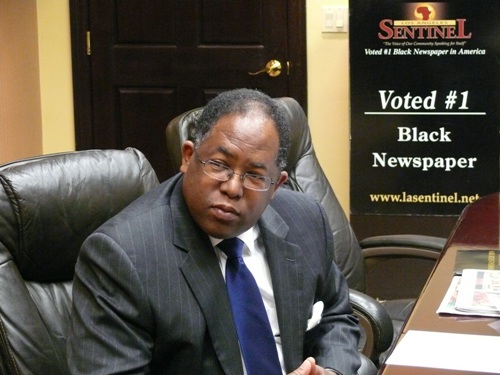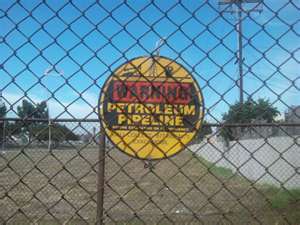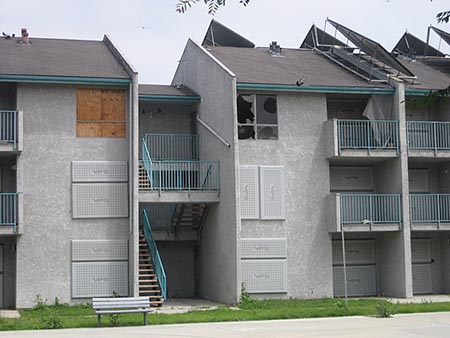 S
S
Supervisor Mark Ridley Thomas

The warning sign

What once was …
Supervisor vows to seek justice for Ujima Village
Before Supervisor Mark Ridley-Thomas was elected to the 2nd district, contaminated soil was unearthed at Ujima Village; now he’s taking the lead to see that justice is done.
By Yussuf J. Simmonds
Brandon Brooks and Joy Childs contributed to this article.
The story of Ujima Village is riddled with twists, turns, inconsistencies, allegations and hearsays. But there are certain facts that are undisputed–sound and solid. Exxon-Mobil was the last commercial owner of the property. It was previously used as a storage and distribution site for petroleum products including a storage for crude-oil, gasoline, diesel fuel and fuel oil. According to available public records, there were 22 storage tanks and two concrete-lined crude-oil reservoirs.
This was the site on which the Ujima Village Housing Development (UVHD) was built in the early 1970s. It was funded (mortgage insured) as a private development by the U. S. Department of Housing and Urban Development (HUD). Named “Ujima,” after the third principle of Kwanzaa meaning “collective work and responsibility,” the village was prided as an oasis in the desert, with close proximity to two other esteemed institutions in the Black community: Charles Drew University of Medicine and Science founded ( in the mid-1960s), and Dr Martin Luther King Jr. Hospital (in the early-1970s).
Around 1995, HUD sold the property to the Los Angeles County Housing Authority, after it was foreclosed on and taken back by HUD, from the private development company.
According to an environmental history by the California Water Boards: PRIOR TO THE SALE OF UJIMA VILLAGE APARTMENT COMPLEX (aka UVHD) TO THE (LOS ANGELES COUNTY) HOUSING AUTHORITY, HUD CONDUCTED A “LIMITED” ENVIRONMENTAL INVESTIGATION WHICH FOUNDED THAT THE SOILS UNDERNEATH THE PROPERTY CONTAINED CHEMICALS ASSOCIATED WITH PETROLEUM PRODUCTS FROM HISTORICAL OPERATIONS.
(The “historical operations” referred to, apparently included, but were not limited to the use as a storage facility for crude-oil, gasoline, gasoline, diesel fuel and fuel oil in the 22 storage tanks and the two concrete-lined crude-oil reservoirs).
Continuing … AFTER ANALYSIS OF THE DATA COLLECTED, HUD DETERMINED THAT THE PRESENCE OF THESE CHEMICALS DID NOT PRESENT A SIGNIFICANT HEALTH RISKS TO THE RESIDENTS (TENANTS). SUBSEQUENT TESTING CONDUCTED IN JUNE 2006 RECONFIRMED THE PRESENCE OF PETROLEUM-RELATED CHEMICALS INSOILS AND ALSO THE PRESENCE OF PETROLEUM-RELATED CHEMICALS IN THE GROUNDWATER.
Since then a lot has transpired that altered the living standards, the living conditions and the quality of life of the tenants at UVND. It was reported that the residents of UVHD paid their rent faithfully every month to LA County who accepted their money … and took their health away. The tenants were ‘collectively’ getting sick and according to sources, although the soil was contaminated, the county believed it did not pose a significant health risk. But the tenants were still sick and/or getting sick. Something was obviously wrong.
Enter Supervisor Mark Ridley-Thomas, in whose second district, UVHD with all of its problems, is located.
At this time, a civil lawsuit has been filed (April 9th, 2010) in Los Angeles County Superior Court. It alleges that contamination at the 300-unit Ujima Village complex built on a former oil tank storage site caused 38 deaths and hundreds of cases of cancer, leukemia, miscarriages, respiratory distress, chronic infections, asthma, anemia and cognitive and neurological issues.
According to court records, the lawsuit started with about 1,000 named plaintiffs–the former residents of UVHD.
The list of Defendants included, but was not limited to, Exxon Mobil Oil Corporation; AECOM Technical Services, Inc.; County of Los Angeles; Housing Authority of the County of Los Angeles; Community Development Commission of the County of Los Angeles; Carlos Jackson, the Executive Director, officer and employee of HOUSING AUTHORITY and CDC; Bobette Glover, the Assistant Executive Director, officer and employee of HOUSING AUTHORITY and CDC; Associated Financial Corporation; Ujima Housing Corporation; Alpha Property Management; Galaxy Homes; Ferguson & Shannon Development Company; Braewood Development Corporation
According to the Supervisor, the former residents (tenants) of UVHD should receive every possible consideration, as much information and all the appropriate services that are available from the county. He has asked the (County) department of Health Services to enroll individuals into health insurance programs so that they can obtain health care access.
In addition, Supervisor Ridley-Thomas, in advocating for those affected by the contamination at UVHD and others in close proximity, including the Honey’s Little Angels Child Care Center which he has stated that its relocation will be his top priority at the earliest date in 2012–in order to protect the children and remove all doubt about their safety and health.
Furthermore, he has emphasized that the extent of the contamination should be determined and Exxon-Mobil should complete the clean-up at the earliest possible date. They must also be held accountable for cleaning up the contaminated land, and making the community whole since they are responsible for causing the contamination.
The Los Angeles Sentinel posed some questions to the Supervisor that generated the following responses:
LOS ANGELES SENTINEL (LAS): What are the plans to analyze and clean up the contaminated soil at the Ujima Village site?
SUPERVISOR MARK RIDLEY-THOMAS (MRT): An investigation is currently being conducted by the Los Angeles Regional Board to determine the extent of the contamination. After the Water Board determines the scope of the problem, it will direct Exxon-Mobil on how to clean-up the property. The full clean-up strategy has not yet been determined.
LAS: Some of the tenants that the Sentinel interviewed were pleased with the relocation package they received from the county and/or the Housing Authority, and others were not. Are there any outstanding issues (legal or otherwise) presently pending relative to some of the tenants?
MRT: As of August 2010, all of the residents from Ujima Village had been relocated. In 2009, I effectively urged the Housing Authority to cease eviction efforts, and I personally met with all of the remaining residents in Ujima Village to make sure that they were receiving proper relocation support. In regards to outstanding legal issues, as you may know, many resident chose to file suit against the Housing Authority, Exxon and other entities related to alleged health concerns. This is currently being evaluated through the courts.
LAS: It is my understanding that when Ujima Village was built in the ’70s, the environmental studies for such a development were not as stringent as they are today; will there be or has there been such a study done on the site since the tenants have vacated?
MRT: The standards for development in 2011 are definitely very different form the 1970s. In regards to additional study, since 2007, the Los Angeles Regional Water Board has conducted a comprehensive environmental review to confirm the exact scope of contamination in the area, and once that is completed, will finalize its clean-up plan.
LAS: Since this is also in 37 th Congressional District, I believe, has there been any effort to seek any federal assistance from the representative or from HUD?
MRT: Yes. Over the past few years, I have made several trips back to Washington, D.C. to meet with HUD representatives to get to the bottom of resolving Ujima Village issues, ranging from relocation, clean-up and demolition, to the future use of the site.
LAS: Is there anything else that the Supervisor would like the public to know about the county’s plans, goals and objectives for Ujima Village?
MRT: I’d like to leave you with several points.
(HERE, THE SUPERVISOR RE-EMPHASIZED SOME OF HIS PRIORITIES, ALREADY STATED ABOVE, FOR THE FORMER RESIDENTS OF UVHD)
a. My highest priority as a Supervisor is to make sure that the former residents of Ujima Village receive every possible consideration, as much information and all the appropriate services that are available from the county.
b. The extent of the contamination should be determined and Exxon should complete the clean-up in an expeditious manner. Exxon-Mobil must be held accountable for cleaning up the contaminated land and making the community whole.
c. The Honey’s Little Angels Child Care Center, which is located adjacent to Ujima Village, will be relocated at the earliest possible date in 2012. This is my top priority–to protect the clildren and to remove all doubt about their safety and health.
d. I believe that individuals who have health-related concerns deserve access to doctors and health professionals to treat them for their health problems. Upon my request, within the next few weeks, the Department fo Health Services will begin an outreach effort to enroll interested individuals into health insurance programs so that they can obtain access to care.
e. Local, state and federal agencies need to communite clearly with the impacted residents so that community questions and concerns can be answered to the community’s satisfaction and understanding on the contamination and clean-up efforts.
f. The department of Public Health is available on a 24-hour basis to respond to Ujima health questions through the County’s 211- line.
When the Supervisor held his community more than 250 people attended the informational meeting where they received an update on the environmental investigation into oil-related contamination at the former Ujima Village apartment complex.
Officials from the Los Angeles Regional Water Board, the Los Angeles Community Development Commission, the Department of Parks and Recreation and the County Assessor’s Office also were on hand at the Martin Luther King, Jr. Center for Public Health in Willowbrook, to provide an overview of the ongoing soil, water and air quality sampling and to answer questions and address concerns.
At the meeting’s outset, the Supervisor emphasized that there will be a series of community meetings to follow and that he is focused on relocating Little Honey’s Day Care Center, which is adjacent to the Ujima Village site, as quickly as possible. The meeting was often heated, with audience members expressing strong frustration and anger about the contamination at the complex where many said they had lived for decades. The former village residents asked a variety of questions concerning their health, the longevity of the investigation, and what they individually need to do in order to ensure their statements are included in the investigation.
At the meeting, Executive Officer, Samuel Unger of the Water Board said environmental testing determined that contamination was far below ground, and that air quality for the neighborhood was consistent with that of the region.
Director of Environmental Health, Angelo Bellomo of the Department of Public Health said that the contamination does not currently present a threat to human health at the daycare site or at the former site of the village, but most of the audience greeted that assertion with a high degree of skepticism.






